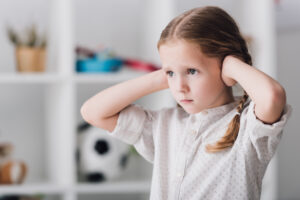The Association for Autism and Neurodiversity (AANE) helps us to understand that autism, put simply, is a neurotype or “brain type.” Approximately 2% of people have an autistic neurotype.
All neurotypes have areas of strength and areas that need more support. People with an autistic neurotype have incredible strengths that can include their attention to detail, ability to focus, keen observational skills, and unique creativity. People with an autistic neurotype may have support needs in areas such as emotional and sensory regulation, executive functioning, and relationship maintenance.
This may be a different way of understanding autism, especially for people familiar with the traditional way that the mental health community defines autism.
Autism Spectrum Disorder (ASD) is listed in the DSM-5-TR (Diagnostic and Statistical Manual of Mental Disorders Fifth Revision Text Revision) by the American Psychiatric Association (2022) as a neurological and developmental disorder. This means that autistic traits must be present in childhood.
The DSM uses deficit-based language in order to define the categories of autistic traits. These categories include deficits in social communication, interaction with others, and patterns of restricted or repetitive behaviors, interests, or activities.
It is critical to note that this deficit based language has caused harm to the autistic community and drives some of the myths about autism. This is one of the ways in which the mental health community itself has in fact caused harm to autistics, and why it is so important to gain a neurodiversity affirming perspective, like that illustrated by AANE, and clear up some of the common myths about autism.
Myth 1: Autism is caused by bad parenting or neglect
 The book NeuroTribes: The Legacy of Autism and the Future of Neurodiversity by Steve Silberman gives an extensive explanation as to where this myth comes from. Historically, psychologists actually did attribute autism to bad parenting and neglect, particularly by mothers. However, we have grown significantly in our understanding of the brain and research has shown that autism is absolutely not caused by bad parenting or neglect.
The book NeuroTribes: The Legacy of Autism and the Future of Neurodiversity by Steve Silberman gives an extensive explanation as to where this myth comes from. Historically, psychologists actually did attribute autism to bad parenting and neglect, particularly by mothers. However, we have grown significantly in our understanding of the brain and research has shown that autism is absolutely not caused by bad parenting or neglect.
Myth 2: Autism can be cured or outgrown
Autism describes the way our brains will work throughout our entire lifespan. Not only is there not a cure for autism, but there should not be one. This myth is particularly harmful to the autistic community as it communicates that our very being is wrong. It. This is why it is critical that we begin using a neurodiversity-affirming lens, which allows us to both embrace strengths and address the challenges faced by autistics.
Myth 3: Autism is solely a male condition
Boys are in fact diagnosed with autism at a higher rate. According to the CDC, in 2010, 1 girl was diagnosed for every 4.5 boys. In 2020, 1 girl for every 3.8 boys was diagnosed with autism. As time progresses, we can see that more girls are being diagnosed. However, we should also consider the bias in research, which in the past focused a great deal on white males.
Research is now showing that autism is more likely to present differently in people assigned female at birth, gender diverse people, and those from non-white ethnicities. This means that people who are not white cisgender boys have a much higher likelihood of being underdiagnosed and misdiagnosed. It is critical that we eradicate the myth that only boys can be autistic, so that we can recognize and support autistic individuals of all genders and ethnicities.
Myth 4: Vaccines cause autism
There is no evidence that vaccines cause autism. An article published through the Mayo Clinic by LeGare (2022) explains that there was a small study that showed a potential link between autism and childhood vaccines in 1998. After this study was reviewed, it was retracted and the author of the study had his medical license revoked due to falsifying information that showed there may have been a link. Vaccines help people develop a natural immunity to viruses and help to protect those around us. They do not cause autism.
Myth 5: Autistic individuals lack empathy or emotions
It is a common misconception that autistic people lack empathy or emotions. Autistic individuals can have differences in interoception, which is the body’s ability to understand and feel what is happening inside of it. Therefore, autistic individuals may not react as strongly or in the same way that neurotypical peers may respond.
A researcher named Milton explains in his original article published in 2012 the idea of the double empathy problem. “Double empathy” means that there can be a misunderstanding between any two people that causes a perceived lack of empathy. However, past research focused on framing the autistic individual as the problem, perpetuating the myth that autistics aren’t empathetic. Milton helped give voice to many within the autistic community, who have commonly expressed a lack of understanding from neurotypical people and the mental health community. Autistic people have empathy and feelings; they just might express them differently.
In order to move past the myths and misconceptions about Autism, let’s examine a few facts.
Fact 1: Early intervention and support are crucial for autistic individuals
Autistic individuals face a world of misunderstanding, as seen in the last myth. This can make daily interactions constantly invalidating and even traumatizing. If we can identify the way our brains work at an earlier age, we can give autistics and the people in their lives experiences of being understood, accepted, and validated.
Fact 2: Autistic individuals have unique strengths and abilities
One of the biggest ways to dispel the above myths is to recognize the strengths and abilities of autistic individuals. These are unique for each autistic person and can be in many different categories, including skills in organization, memorization, pattern recognition, attention to detail, and unique creativity.

Fact 3: Sensory sensitivities and challenges are common in autism
Sensory sensitivities can be extremely disruptive to an autistic individual’s daily life. It is not as simple as “not liking bright lights.”
Due to the differences in the way autistics perceive body sensations, bright lights in an autistic person sensitive to them can make it impossible to see or give them terrible headaches. This is one reason you may see reactions that seem more extreme than anticipated.
The impact of sensory sensitivities can be so intrusive that they prevent autistics from doing daily activities. This is why it is imperative that we seek and follow through with opportunities to accommodate sensory sensitivities in the environment.
There are many myths out there about autism that have done harm to the autistic community. By continuing to debunk these myths, learn the facts, and embracing autistics for who they are, we can end this harm and enrich all of our lives.
Blog written by Sentier therapist Mary Devorak (they/she), MS, LMFT.
Sources
American Psychiatric Association. (2022). Neurodevelopmental disorders. In Diagnostic and statistical manual of mental disorders (5th ed., text rev.).
Association for Autism and Neurodiversity. (2023, November 28). https://aane.org/
Center for Disease Control and Prevention. (2022). Data Visualization Tool. Autism Spectrum Disorder (ASD). https://www.cdc.gov/ncbddd/autism/data/index.html
LeGare, J. (2022). Link between autism and vaccines debunked. Speaking of Health. https://www.mayoclinichealthsystem.org/hometown-health/speaking-of-health/autism-vaccine-link-debunked
Milton D. (2012). On the ontological status of autism: The ‘double empathy problem’. Disability and Society, 27(3), 883–887.
Silberman, S. (2015) Neurotribes: The Legacy of Autism and the Future of Neurodiversity. Avery, New York. https://doi.org/10.1353/anq.2015.0057











